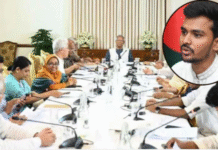
Rakhine state is now experiencing another wave of conflict and human rights violations and displacement, making it harder for the Rohingya to return, UN High Commissioner for Human Rights, Michelle Bachelet, said today.
The new round of conflicts between so-called Arakan Army and Myanmar army and rights violations, two years after the horrific crackdown that forced nearly 743,000 Rohingyas to flee to Bangladesh, is affecting both ethnic Rakhine and Rohingya communities.
It “will make it even harder for refugees and internally displaced people to return,” Bachelet said at her opening statement at the 42nd session of the Human Rights Council in Geneva, which will continue until September 27.
The statement comes when Bangladesh is facing enormous pressures after two failed attempts of Rohingya repatriation – once on November 15 last year and then on August 22 – as Rohingyas refused to return, arguing that the conditions for return in Rakhine state is not right and there is no guarantee of citizenship.
Michelle Bachelet said the recent escalation of clashes in Shan State and long-standing conflicts in Kachin State also cause displacement and human suffering and undermine the peace process.
This session of the Council will hear the final report of the UN Fact Finding Mission, which has given the world a clear picture of the gravity and scale of the violations that have been committed across Myanmar. Myanmar is accused of genocide and ethnic cleansing against the Rohingyas.
“The need for accountability is compelling and urgent, and I am very pleased to note that the Independent Investigative Mechanism for Myanmar, which was established by the Council in its historic resolution 39/2, was declared operational by the Secretary-General in August,” she said.
She urged the Myanmar government to cooperate with the international mechanisms that have been established both to ensure justice and consolidate Myanmar’s democratic transition.
Despite pressures from the international community, Myanmar has so far denied the allegations of genocide and ethnic cleansing. It has also not provided access to the UN investigators to Rakhine state.
Restrictions on mobile communications deepen vulnerability
British human rights charity, Article 19, meanwhile, said the decision by Bangladesh authorities to restrict access to mobile telecommunications services by Rohingya refugees violates the rights to freedom of expression, information and non-discrimination.
The decision also follows the imposition by the Myanmar government of a mobile Internet blackout in western Myanmar affecting areas that were formerly home to many Rohingya.
“The order will have an enormously detrimental impact on the Rohingya refugee population,” said Faruq Faisel, ARTICLE 19’s Regional Director for Bangladesh and South Asia.
“These measures will deepen the vulnerability and isolation of a traumatised community that has suffered horrific violence and persecution.
Bangladeshi authorities claim they are protecting national security and public order but have failed to put forward any credible justification for such a sweeping measure.”
Non-refugee communities residing near the camps have reportedly been impacted by the changes to mobile internet services.
ARTICLE 19 called on the Bangladesh Telecommunication Regulatory Commission to withdraw its recent order and to ensure that the Rohingya refugee community has unrestricted access to essential telecommunications services.
ARTICLE 19 said the internet shutdown in Rakhine state is against international human rights law and violation of the rights to freedom of expression and information. It called on Myanmar government to end the Internet shutdown.









